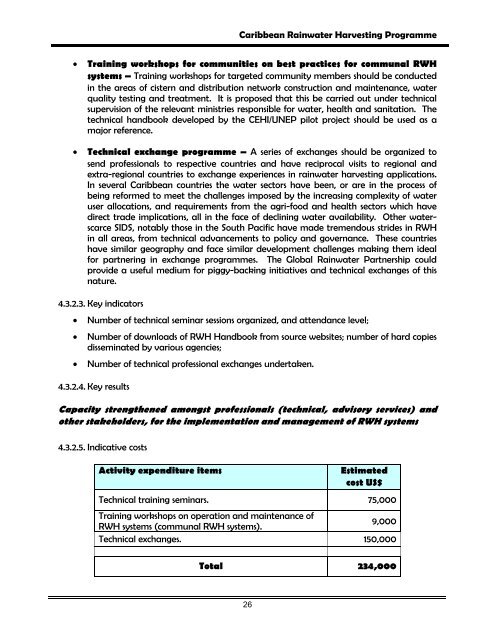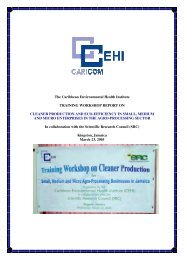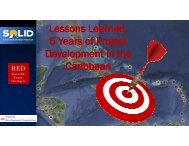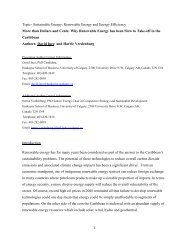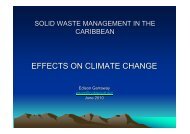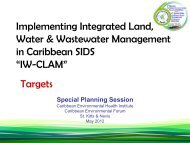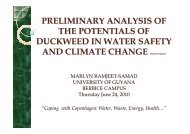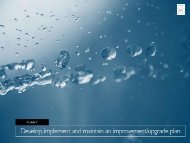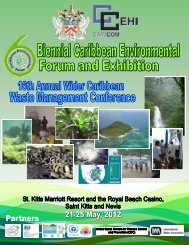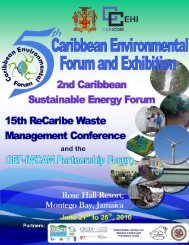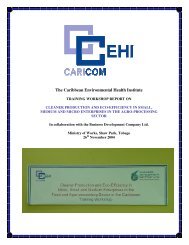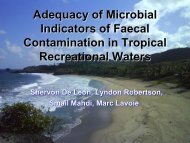A programme for Promoting Rainwater Harvesting in the Caribbean
A programme for Promoting Rainwater Harvesting in the Caribbean
A programme for Promoting Rainwater Harvesting in the Caribbean
You also want an ePaper? Increase the reach of your titles
YUMPU automatically turns print PDFs into web optimized ePapers that Google loves.
<strong>Caribbean</strong> <strong>Ra<strong>in</strong>water</strong> <strong>Harvest<strong>in</strong>g</strong> Programme• Tra<strong>in</strong><strong>in</strong>g workshops <strong>for</strong> communities on best practices <strong>for</strong> communal RWHsystems – Tra<strong>in</strong><strong>in</strong>g workshops <strong>for</strong> targeted community members should be conducted<strong>in</strong> <strong>the</strong> areas of cistern and distribution network construction and ma<strong>in</strong>tenance, waterquality test<strong>in</strong>g and treatment. It is proposed that this be carried out under technicalsupervision of <strong>the</strong> relevant m<strong>in</strong>istries responsible <strong>for</strong> water, health and sanitation. Thetechnical handbook developed by <strong>the</strong> CEHI/UNEP pilot project should be used as amajor reference.• Technical exchange <strong>programme</strong> – A series of exchanges should be organized tosend professionals to respective countries and have reciprocal visits to regional andextra-regional countries to exchange experiences <strong>in</strong> ra<strong>in</strong>water harvest<strong>in</strong>g applications.In several <strong>Caribbean</strong> countries <strong>the</strong> water sectors have been, or are <strong>in</strong> <strong>the</strong> process ofbe<strong>in</strong>g re<strong>for</strong>med to meet <strong>the</strong> challenges imposed by <strong>the</strong> <strong>in</strong>creas<strong>in</strong>g complexity of wateruser allocations, and requirements from <strong>the</strong> agri-food and health sectors which havedirect trade implications, all <strong>in</strong> <strong>the</strong> face of decl<strong>in</strong><strong>in</strong>g water availability. O<strong>the</strong>r waterscarceSIDS, notably those <strong>in</strong> <strong>the</strong> South Pacific have made tremendous strides <strong>in</strong> RWH<strong>in</strong> all areas, from technical advancements to policy and governance. These countrieshave similar geography and face similar development challenges mak<strong>in</strong>g <strong>the</strong>m ideal<strong>for</strong> partner<strong>in</strong>g <strong>in</strong> exchange <strong>programme</strong>s. The Global <strong>Ra<strong>in</strong>water</strong> Partnership couldprovide a useful medium <strong>for</strong> piggy-back<strong>in</strong>g <strong>in</strong>itiatives and technical exchanges of thisnature.4.3.2.3. Key <strong>in</strong>dicators• Number of technical sem<strong>in</strong>ar sessions organized, and attendance level;• Number of downloads of RWH Handbook from source websites; number of hard copiesdissem<strong>in</strong>ated by various agencies;• Number of technical professional exchanges undertaken.4.3.2.4. Key resultsCapacity streng<strong>the</strong>ned amongst professionals (technical, advisory services) ando<strong>the</strong>r stakeholders, <strong>for</strong> <strong>the</strong> implementation and management of RWH systems4.3.2.5. Indicative costsActivity expenditure itemsEstimatedcost US$Technical tra<strong>in</strong><strong>in</strong>g sem<strong>in</strong>ars. 75,000Tra<strong>in</strong><strong>in</strong>g workshops on operation and ma<strong>in</strong>tenance ofRWH systems (communal RWH systems).9,000Technical exchanges. 150,000Total 234,00026


